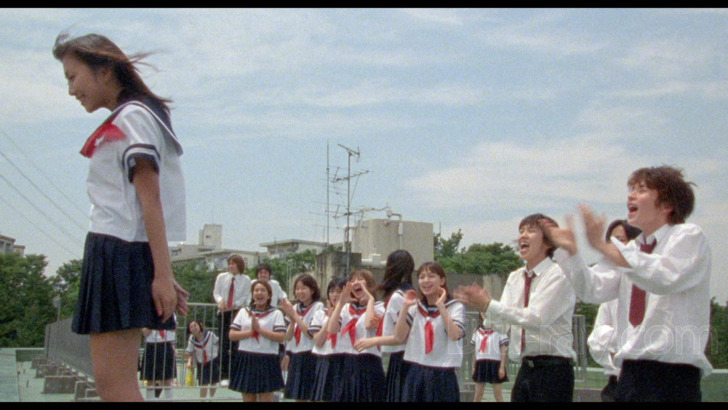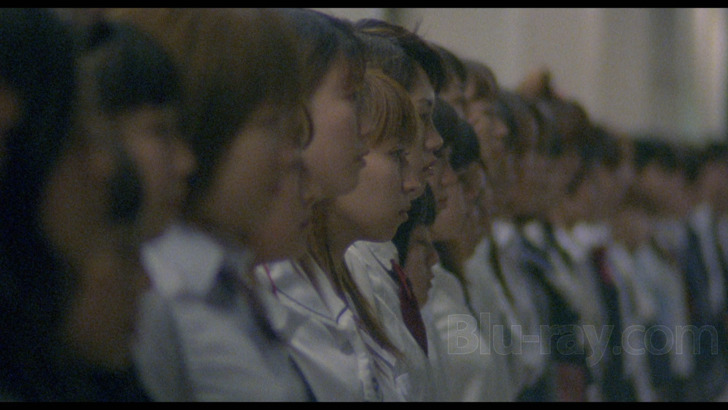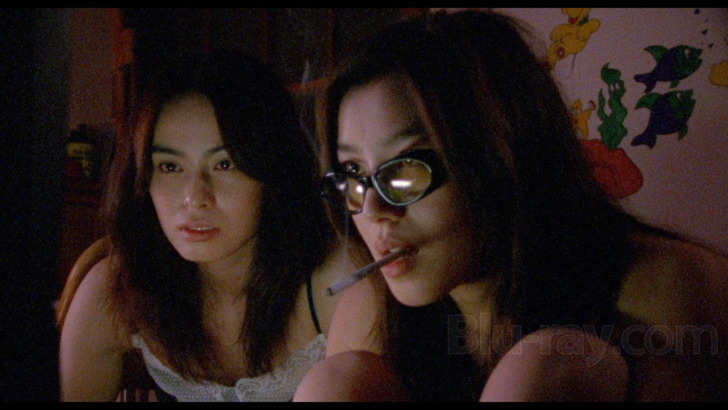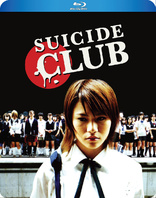Suicide Club Blu-ray Movie
HomeSuicide Club Blu-ray Movie 
自殺サークルDiscotek Media | 2001 | 100 min | Unrated | Apr 25, 2023
Movie rating
6.9 | / 10 |
Blu-ray rating
| Users | 0.0 | |
| Reviewer | 4.0 | |
| Overall | 4.0 |
Overview
Suicide Club (2001)
On a day like any other at Shinjuku Station, 54 smiling schoolgirls throw themselves in front of a train in a spectacular splatter of blood. This shocking scene opens Sono Sion's cult suspense about a suicide epidemic sweeping through Japan, and the police's rush to find the cause behind the separate yet seemingly connected deaths.
Starring: Ryo Ishibashi, Masatoshi Nagase, Kimiko Yo, Tamao Satô, Yukijirô HotaruDirector: Sion Sono
| Foreign | Uncertain |
| Horror | Uncertain |
| Mystery | Uncertain |
| Thriller | Uncertain |
| Drama | Uncertain |
| Crime | Uncertain |
Specifications
Video
Video codec: MPEG-4 AVC
Video resolution: 1080p
Aspect ratio: 1.85:1
Original aspect ratio: 1.85:1
Audio
Japanese: DTS-HD Master Audio 2.0
Subtitles
English
Discs
Blu-ray Disc
Single disc (1 BD)
Packaging
Slipcover in original pressing
Playback
Region A (locked)
Review
Rating summary
| Movie | 4.5 | |
| Video | 4.5 | |
| Audio | 4.5 | |
| Extras | 1.5 | |
| Overall | 4.0 |
Suicide Club Blu-ray Movie Review
Reviewed by Neil Lumbard June 20, 2023Suicide Club is a thought-provoking and disturbing horror thriller involving the difficult subject matter of suicide. Produced by Seiya Kawamata, Junichi Tanaka, Toshiie Tomida, and Seiji Yoshida, Suicide Club is simultaneously sophisticated Japanese horror and a genre film that isn’t something for the faint of heart. Executive produced by Atsushi Numata and Toyoyuki Yokohama, Suicide Club explores the growing problems of a suicide cult – or something that seems to resemble exactly that.
Detective Kuroda (Ryo Ishibashi) is joined by the entire police force on a mission to uncover the truth behind a series of grisly suicides by teenagers all across Japan. In what appears to be a sequence of similar suicide pacts by large groups of teenage students, Detective Kuroda and others wonder if perhaps a ‘suicide fad’ is what the case boils down to. The suicide events begin with a group of 54 teenage girls throwing themselves in front of a subway platform – blood bursting across the moving subway train.
A mystery unfolds when a mysterious phone call foretells of future suicide events. The police are led down a rabbit hole to a strange website that has information about the suicides (perhaps even before the suicides happen). The question becomes: are these events even mass suicides or is there a sinister force at play?
Part mystery and part horror, Suicide Club explores a disturbing and thought-provoking world. Teenager Mitsuko (Saya Hagiwara) is pulled in to the wave of suicides happening. What will happen to Mitsuko and can the “suicide club” be stopped?
The performances in Suicide Club are impressive and work well within the story. Saya Hagiwara delivers an especially impressive performance as one of the teenagers involved in the circumstances of these suicides. Ryo Ishibashi is also noteworthy for his performance as Detective Kuroda. The role was an excellent fit for Ishibashi. There is something wonderfully special about the performance and how it manages to aid the mystery elements of the story. Without the more serious tone established by the performance by Ishibashi, Suicide Club might have veered itself even more towards the satirical side of the film.

The production features cinematography by Kazuto Sato (Flower and Snake, Scream Girls). The visual style is compelling and bold. Considering the dark and gothic style of the filmmaking, Suicide Club is capable of showcasing a nice range of visual qualities – from the morbid darkness of some of the sequences depicting suicide to the lighter moments highlighted throughout. The visuals convey something between the lines of foreboding horror and drama.
The original score composed by Tomoki Hasegawa (Legend of the Galactic Heroes Gaiden: Golden Wings, Magician's Academy!) adds to the filmmaking. The score certainly fits the narrative and tone of Suicide Club. Composer Hasegawa manages to contribute an eerie and surrealist sounding score that fits the darker tone of the filmmaking well.
Edited by Masahiro Ônaga (Dragon Head, Barren Illusions), Suicide Club manages to have a nice sense of rhythm and the pace is well established from the beginning of the narrative. Ônaga handles the material well and capably edits together the film in a manner that is both thrilling and disturbing. The editing of the film plays a big role in the viewing experience.
Yoshihiro Nishimura (Tokyo Gore Police, Meatball Machine Kodoku) played a big role in the production by handling the production design, art direction, and special make-up effects. These elements of the production are effective and add a lot to the experience. The style is often haunting – horrifying and surreal. The blood splatter and make-up effects are sometimes over-the-top and hype stylized (a contrast to some of the more realistic elements). The work is effective for the narrative.
Written and directed by Sion Sono (Love Exposure, Tag), Suicide Club is a non-traditional horror film and thriller. There is a strong mystery element and Sono plays in to this aspect of the story while also doing something experimental with the filmmaking. Sono is a unique voice in cinema and provides the film haunting imagery and surrealist elements while also finding a way to integrate scenes that are more realistic as well.
The contrast and balance between the genre tones is something that is interesting. Despite being hyper-stylized and playing as a horror film in some respects, Sono also seems to make a strong statement by the end of the film – one about living life to its fullest. The ending gave me chills and Suicide Club is a film that will stay with viewers long after the credits have rolled. Don’t live life for no reason, live it exceptionally well.
Suicide Club Blu-ray Movie, Video Quality 

Arriving on Blu-ray from Discotek Media, Suicide Club is presented in 1080p MPEG-4 AVC encoded high definition in the original theatrical aspect ratio of 1.85:1 widescreen. The presentation is an excellent one. Discotek has done a great job with the master and the video presentation is impressive with a wonderful sense of depth. Color reproduction appears accurate and adds to the style of the film.
Considering the dark tone of the film, the cinematography reflects this often and the encode capably handles the darker colors and the foreboding nature of the visuals. This is not a presentation that is bright and cheery: quite the opposite. The aesthetic fits the tone of the film and the encoding helps showcase that side of the film.
There are some sequences with lower-resolution footage due to clips used in the film and this is no detriment to the video score. An impressive effort from Discotek Media and one with a healthy bit-rate. Viewers can also rest easy knowing that the Blu-ray disc format offers superior encoding to streaming video services (which provide video with a less consistent bit-rate and presentation method).
Suicide Club Blu-ray Movie, Audio Quality 

The release is presented in Japanese DTS-HD Master Audio 2.0 (with English subtitles). The lossless audio quality on the Blu-ray release sounds crisp and clear throughout the presentation. The score from composer Tomoki Hasegawa is highlighted well by the audio encoding. The audio track has a good sense of vitality.
Detail is well reproduced for the audio soundstage. Suicide Club is sometimes a film with dark elements – such as blood splattering against the station train – and the sound effects capture this in the sound design well. The subtitles on the release are excellent and are free from any egregious spelling or grammatical errors. The release does not include an English dubbed option. (One must learn to use subtitles to open their eyes to a larger landscape of world cinema). A worthwhile lossless encode from Discotek Media.
Suicide Club Blu-ray Movie, Special Features and Extras 

The release includes an impressive looking o-card slipcover. The sleeve artwork underneath the slipcover includes reversible key artwork so one can display additional key art after taking off the slipcover. The additional art adds a nice touch to the release and represents a solid package design from Discotek Media.
The only real disappoint to the release is the lack of a more impressive supplemental package. The release would have benefited from audio commentaries or behind-the-scenes documentaries. Unfortunately, the release does not include these kinds of extra features and is barebones.
The only on disc supplement is:
Theatrical Trailer (HD, 1:38)
Suicide Club Blu-ray Movie, Overall Score and Recommendation 

Suicide Club is an intelligent and thought-provoking Japanese film with elements of horror, thriller, and mystery. Though Suicide Club has a hyper-stylized aspect to it (with some of the suicides being quite gruesome) and other zanier elements, Suicide Club is nonetheless a film that offers up some smart dialogue if one pays close attention to the filmmaking. The film does ultimately have a message – something to say. Live life to its fullest.
Discotek Media should be commended for including a warning message at the start of the disc due to the film displaying graphic visuals of suicide. The opening message also gives information on suicide prevention and intervention. This is always an important topic and I am proud of Discotek Media for making sure to include this kind of message on the release of Suicide Club.
Discotek Media did a fantastic job with the presentation – providing excellent video and quality lossless audio. Fans of the film will consider this an excellent high-definition upgrade and a release well worth owning. Highly recommended.
Similar titles
Similar titles you might also like

The Cat o' Nine Tails 4K
Il gatto a nove code | Special Edition
1971

High and Low 4K
天国と地獄 / Tengoku to jigoku
1963

Death Walks on High Heels
Special Edition | La morte cammina con i tacchi alti
1971

The Wailing 4K
곡성 / Goksung
2016

Tenebrae 4K
Standard Edition
1982

Sleepless 4K
Non ho sonno / Slipcover in Original Pressing
2001

Mother
마더 / Madeo
2009

Tomie
富江 | Limited Edition
1998

Cure
キュア / Kyua
1997

Gore in Venice
Giallo in Venice / Giallo a Venezia
1979

Diabolique
Les diaboliques
1955

Pulse
回路 / Kairo
2001

Gemini
双生児
1999

Death Carries a Cane
Passi di danza su una lama di rasoio
1973

Murder Obsession
Follia omicida
1981

Deep Red 4K
Profondo rosso
1975

The Strangler of Blackmoor Castle
Der Würger von Schloß Blackmoor
1963

The Card Player 4K
Il cartaio / Slipcover in Original Pressing
2004

Big Bad Wolves
מי מפחד מהזאב הרע / Mi mefakhed mehaze'ev hara
2013

Killer Nun
Suor Omicidi
1979
